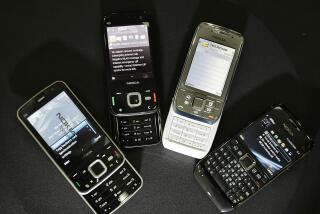It’s enough to set your Blueteeth on edge
- Share via
The Bluetooth was my tipping point.
I could indulge my technophobia by treating my company-issued BlackBerry only as a telephone and pretending my Walkman was just as good as your iPod.
But unless I wanted to be like the driver my friend recently spotted -- talking into a cellphone strapped to his head with a rubber band -- I’d have to get my wireless headset running.
So I had someone charge it, program it and turn it on for me. But I never managed to make or receive a call. I tried to wear it once; it kept falling off. Frustrated, I threw it into my purse . . . then somehow lost it.
Since then, I’ve tried to convince myself I’ll be fine without it. I can always punch the speaker button on the phone if someone calls. If I could only find the icon.
At least I’m ahead of John McCain, who made news this month with his admission that he requires a guide to get online and is still learning how to do “a Google.” Or actress Angelina Jolie, who has to rely on hubby Brad Pitt to turn her computer off and on.
I Google constantly. I can also text, plug an address into my car’s GPS and set my cellphone alarm to wake me up.
But I can’t figure out the remote control that operates my cable box, television and DVD player. I don’t know how to e-mail a photo from my camera to my relatives back East. And I can’t go online with my BlackBerry because I refuse to wade through its 63-page “welcome guide.”
I’ve begun to wonder what that says about me and my relationship with technology. So I called Professor Robert Bilder, a neuropsychologist who heads UCLA’s Tennenbaum Center for the Biology of Creativity.
He told me technophobes tend to feel overwhelmed not because they can’t learn how to work their gadgets, but because they haven’t. “It comes down to what it’s worth to you in time and energy,” he said. “As the technology becomes more thrilling, it requires more of a commitment to mastery.”
Thrilling?
“It’s thrilling to be sitting in your car when a call comes in,” Bilder said, “and you’re able to say ‘hello’ and you don’t even have to be pushing a button.”
Or in my case, you’re able to disconnect the caller by fumbling around in your ear with your index finger.
Bilder considers our new wireless world “science fiction operating in the present. . . . Human capacity is lagging behind.”
But what if you don’t want to catch up? I find myself feeling intimidated -- annoyed, even -- by the proliferation of technology. Each new must-have device ratchets up my feelings of incompetence; makes me want to withdraw and retire to bed with a book -- and not feel deficient because it’s not a Kindle.
I’m not even sure I know what a Kindle is, except that “its revolutionary electronic-paper display provides a sharp, high-resolution screen that looks and reads like real paper,” according to Amazon.com.
I also don’t exactly know what Bluetooth is. But I do know where the name came from:
It pays homage to a Danish king -- known for his blue tooth -- who united warring Scandinavian tribes at the end of the first millennium. The scientists who came up with today’s wireless Bluetooth design adopted the nickname early on, and it stuck.
And if you didn’t know that, you really ought spend more time looking stuff up online.
Bilder said I needn’t feel embarrassed by my lack of affection for technology. Some people have “digital” personality types, he said. “They like interacting by proxy -- on the phone or via e-mail. They find it more efficient and less overwhelming, without the pressure of socialization.”
I’m more likely an “affiliative” type, he said, based in part on my request to visit his office and interview him face to face. We like “seeing expressions, hearing the inflections, watching gestures,” he explained.
People like me also fall into the “connected, but hassled” category, according to a questionnaire offered by the Pew Research Center, which annually surveys Americans’ relationship to technology.
But even a scientist like Bilder recognizes technology’s limitations. His packed schedule meant we had to conduct our interview by phone. We fought through echoes and static for the first few minutes, until he offered to call me back.
“Ah, a land line,” he said when we reconnected. “That’s so much better.”
And it was.
--






